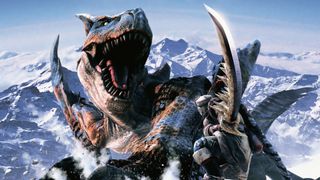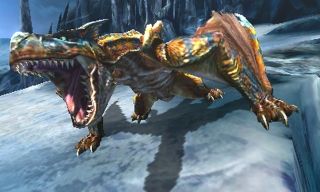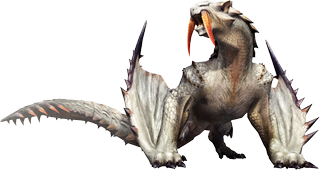It's time for Monster Hunter to come to PC in the West
Capcom's beastly brawler has all the qualities we love in PC games.

There used to be a time when Monster Hunter felt doomed to be hopelessly niche. My evangelism for early Monster Hunter games, grind-heavy action-RPGs where players hunt dragons, used to be met with a blank-faced "what the hell is that?"
That's not the case anymore.
Thanks in large part to the success of Nintendo's 3DS, westerners have started to realize that Capcom's fantastical take on big game hunting is one of the most brilliant ARPGs around. In the same way Dark Souls seemed to inspire its own subgenre, Monster Hunter is a unique blend of progression systems wrapped up in staggeringly complex combat that is often copied but never bettered.
According to an interview in 2016 from Esuteru (via Neogaf), Capcom wants to expand Monster Hunter in the West. If Capcom is serious about taking Monster Hunter global, that likely means returning to home consoles for the next game in the series. But considering how much success Capcom, and most Japanese publishers, have had on Steam, it shouldn't stop there. It's time for Monster Hunter to come to PC—not because it makes financial sense, but because the two are a match made in heaven waiting to happen.
Journey to the west
Monster Hunter is a kind of game that has always flourished on the PC. When you remove the fact that Monster Hunter is essentially a gauntlet of boss fights, it bears a strong similarity with many of Steam's most successful free-to-play games like Warframe.
The idea is simple: Alone or with a group of three friends, you head out to take on missions and earn rewards that increase your ability to survive tougher missions. But where Monster Hunter ascends beyond the rabble of similarly structured F2P games is with, well, the titular hunting. Most missions involve preparing for, tracking, and then battling extremely dangerous creatures in fights that can sometimes last an hour. It's grueling cycle of preparation, meticulous planning, and explosive execution. The payoff at the end is almost always thrilling.

Each of Monster Hunter's hundreds of monsters is essentially its own Dark Souls-style boss fight. They have their own special abilities and patterns that you must master in order to bring them down. And just like Dark Souls, these beasts hit like a truck. To survive the encounter, you'll need to specialize with one of a dozen weapon types that have their own combos and attack styles, like the switch axe that can transform between a sweeping greataxe or a deadly broadsword mid-swing.
PC Gamer Newsletter
Sign up to get the best content of the week, and great gaming deals, as picked by the editors.
There's more to combat in Monster Hunter than dodging attacks and responding with your own. Fights are more akin to a round of boxing, with natural breaks in the action as each party recovers for the next epic clash. During the fight, your weapon will become dull and need to be sharpened and you'll need to eat to keep your stamina up. Likewise, monsters will retreat to catch their breath or hunt smaller creatures for a revitalizing snack.
Monsters have some nasty tricks up their sleeves as well. The Qurupeco, for example, is one of the easiest hunts and most novice players will kill one in their first few hours. Later in the game, these squawking birds go from minor challenge to the most fucking infuriating thing imaginable. Qurupecos can mimic the calls of other monsters to bring in backup when they're in danger. Any Monster Hunter veteran knows the "oh shit" moment when a simple Qurupeco hunt goes belly up because one decided to call a Deviljho—Monster Hunter's version of Blighttown rolled up into one giant dinosaur of suffering.
It's a tragedy that with all of this tense action breaking out on-screen, the only way to experience it is through the lens of 400x240 resolution on a 3DS. Capcom has done an admirable job reducing the game to fit onto Nintendo's handheld, but it's a series that could be awe-inspiring with a bit of graphical muscle under the hood. However, a PC version of Monster Hunter could do a whole lot more than render Qurupeco feathers in HD.
New frontiers
Like Pokemon, Monster Hunter has always been a series that evolves in tiny steps. New monsters, weapons, and a few new systems have kept each game feeling fresh, but it's still largely the same game since it first released in 2004. Some of this boils down to not fixing what isn't broken, but much of it also has to do with being confined to the limitations of underpowered hardware.
This is most keenly felt with the world itself, which is divided up into relatively small zones. This is intentional since fighting hulking monsters in tight spaces emphasizes the importance of positioning. But there's plenty of room to innovate around that idea.
If Monster Hunter were designed from the ground up for PC and this generation's consoles, it would have space to grow in a way the series never has up to this point. Destructible environments could reinvent the way I think about my surroundings during heated fights with monsters and would drive home the immense power of some of these behemoths. A next-gen Monster Hunter could use realistic physics to make each fight feel more dynamic. I can only imagine how great it would be to fight a Rathalos in the depths of a forest, dodging tail swipes and falling trees or having to avoid shrubs that have burst into flames from its fireballs.

One of the cooler features about Monster Hunter on the 3DS was using the second screen as a fully customizable heads up display. Unfortunately, many 3DS users had to use a significant portion of that screen for a digital D-pad to control the camera—harkening back to the series long-standing issue with control schemes. Anyone who played Freedom Unite on the PSP will be all too familiar with the Carpal Tunnel-inducing 'claw grip.' But that's the great thing about the PC: How you play is up to you. While a proper controller will undoubtedly be the standard for most, mouse and keyboard will also provide a great deal of flexibility while skirting the complicated problems that comes with Dark Souls' controls since Monster Hunter doesn't have a light/heavy attack button for each hand.
Taking a step back, releasing on a digital marketplace like Steam even has the potential to change the way Monster Hunter games are shipped. Similar to Pokemon, Monster Hunter faces the issue that each new game introduces and rotates out some of its most iconic beasts. Monster Hunter 4U and Monster Hunter Generations, for example, don't have the Qurupeco (thank god). Because each of these monsters is so unique and memorable, it's a bit of a shame that so many are retired between various generations.
A Monster Hunter game on PC could ostensibly become the definitive Monster Hunter experience that fans have always wanted. Given how modular these games naturally are, new expansions could bring old monsters out of retirement, add new weapons, and expand on gameplay features over time. There's so many possibilities for Capcom to transform Monster Hunter into something that appeals to the current tastes of western gamers—it just has to embrace them.
A Monster Hunter game on PC could ostensibly become the definitive Monster Hunter experience that fans have always wanted.
Of course, sharp Monster Hunter fans will already have identified the key flaw in my argument. Technically, Monster Hunter does exist on PC already. Monster Hunter Online is a quazi-MMO for Chinese PC gamers that is the product of a partnership between Capcom and Tencent. If I had to guess, localizing it for the West would be the easiest way to get a Monster Hunter game on PC (there's already a fan-made English patch if you're really can't wait).
While I'm not opposed to giving the free-to-play version of Monster Hunter a chance, it also represents Monster Hunter at its most basic and exploitable. For example, Monster Hunter Online uses tokens to limit the amount of hunts you can take on in a day—which completely ruins the joy of an evening of binge-hunting. Monster Hunter works because it has the basic structure of a free-to-play game, but instead chooses to treat itself like an annual series. Porting Monster Hunter Online would then, ultimately, feel like a very conservative attempt to test Monster Hunter's appeal to the PC market.
And if Capcom doesn't take a chance on Monster Hunter in the west, someone will beat them to it. Dauntless, a western-developed game inspired by Monster Hunter, is already stirring up significant buzz. It seems clear, at this point, that there's plenty of interest in some big game hunting with or without Capcom.
Monster Hunter 4U sold over one million copies in North America and Europe alone. But with the 3DS' golden years behind it, the series desperately needs a new home if it hopes to continue the trend. Handhelds like the 3DS only represent around 10 percent of the Western market share compared to consoles. That number is considerably smaller if we toss PCs into the equation. While the 3DS is responsible for giving Monster Hunter the spark it needed, it's time to throw some proper logs on the fire.
Last year Capcom brought Dragon's Dogma: Dark Arisen, a three-year-old RPG from last generation consoles, to PC. While I personally loved Dark Arisen, I worried that its quirkier designs and dated graphics would turn most PC gamers away. Instead, it became Capcom's best-selling PC game ever. If a charming-but-janky one-off RPG like Dragon's Dogma can pull that off, I can only imagine how one of Capcom's flagship series might set the bar that much higher.
With over 7 years of experience with in-depth feature reporting, Steven's mission is to chronicle the fascinating ways that games intersect our lives. Whether it's colossal in-game wars in an MMO, or long-haul truckers who turn to games to protect them from the loneliness of the open road, Steven tries to unearth PC gaming's greatest untold stories. His love of PC gaming started extremely early. Without money to spend, he spent an entire day watching the progress bar on a 25mb download of the Heroes of Might and Magic 2 demo that he then played for at least a hundred hours. It was a good demo.
Most Popular



